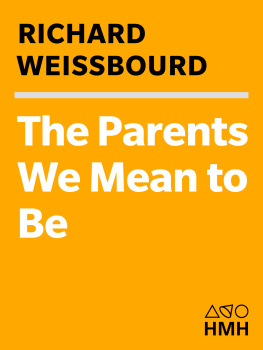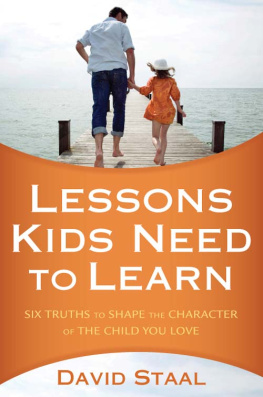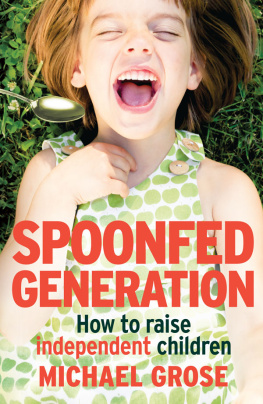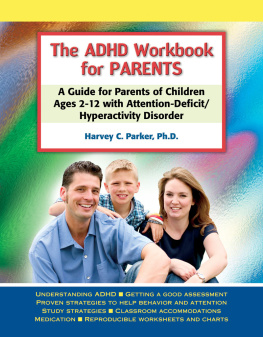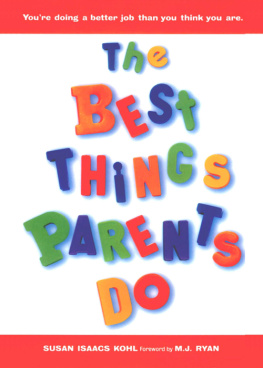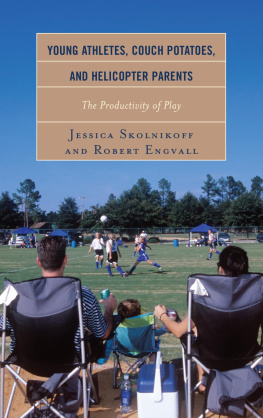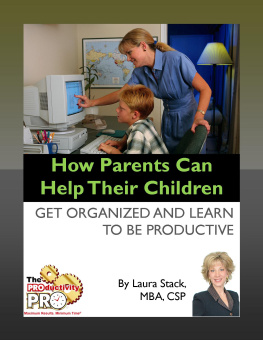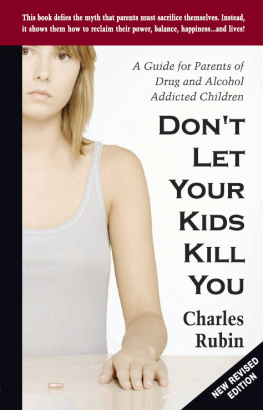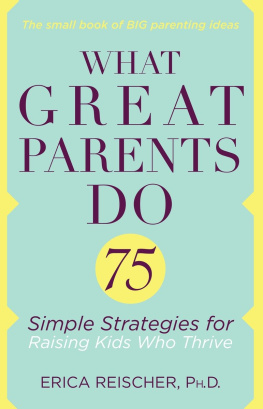To my parents,
Bernard and Bernice Weissbourd
Copyright 2009 by Richard Weissbourd
ALL RIGHTS RESERVED
For information about permission to reproduce selections from this book, write to Permissions, Houghton Mifflin Harcourt Publishing Company, 215 Park Avenue South, New York, New York 10003.
www.hmhco.com
The Library of Congress has cataloged the print edition as follows:
Weissbourd, Richard.
The parents we mean to be : how well-intentioned adults undermine childrens moral and emotional development / Richard Weissbourd.
p. cm.
Includes bibliographical references and index.
ISBN -13: 978-0-618-62617-5
ISBN -10: 0-618-62617-4
1. Child rearing. 2. Parent and child. 3. Moral development.
I. Title.
HQ 772. W 365 2009
649'.7dc22 2008036766
e ISBN 978-0-547-50469-8
v2.0615
Portions of this book previously appeared in the following publications:
Moral Teachers, Moral Students, Education Leadership, vol. 60, no. 6, Association for Supervision and Curriculum Development, March 2003; Down Home, The New Republic, February 25, 2002; The Feel Good Trap, The New Republic, Aug. 19 & 26, 1996; Moral Parent, Moral Child, The American Prospect, Summer 2002; Distancing Dad, The American Prospect, December 6, 1999; and The Vulnerable Child: What Really Hurts Americas Children and What We Can Do About It, Reading, MA: Addison-Wesley, 1996.
Acknowledgments
Although I had been mulling over the ideas in this book for many years, it was sparked into life by a call several years ago from Deanne Urmy, my editor at Houghton Mifflin. The manuscript got steadily better because of her wisdom, superb editing, and great perseverance. But it improved perhaps most essentially because she understood deeply what was at its core and brought to it her own fine morality.
My sharp-minded, good-humored agent, Jill Kneerim, gently helped me over rough patches and is no slouch when it comes to positioning and marketing a book. Yet from the early days she pushed me to focus on how this project would be meaningful to me and contribute to the world. My great thanks to her.
My research team was simply terrific and inspiring. Shira Katz directed this project with great integrity, intelligence, and unflagging good spirits from start to finish and came through in the clutch again and again. Iva Borisova was also there from the beginning, and brought to this work keen insights and the highest moral standards. Mara Tieken joined this project midway and was fresh airshe brought new perspectives and great acuity and resourcefulness. Deborah Porter, a wise and reflective parent, conducted numerous, invaluable interviews with parents. Norma Acebedo-Rey was clear-headed and deft-minded, consistently hitting the nail on the head. Jonah Deutsch helped launch the research and conducted the first, key interviews: he also has great instincts and wisdom far beyond his years. Many thanks, too, to Abby Gegeckas, Daren Graves, Bernadette Maynard, Jennifer Oates, Melissa Steel King, and Moussie and Tara for their crucial help early on.
Thanks to my moral development groupMartha Minow, Larry Blum, and Mary Caseyfor wonderful, energizing ideas and conversation and very helpful comments on numerous drafts. Tom Davey and Jake Murray, close friends, tuned into this book and got me unstuck again and again. Steven Brion-Meisels was remarkably generous and helpful. My writing group partner Gail Caldwell understood the creation of a book at every level. In the final stages of this book, my great friend Jan Linowitz provided superb feedback and advice. Joe Finder and Michelle Souda, close friends, came through at key times. So did Robert Selman and Al Rossiter.
Ken Wapner played a vital role in this book from the beginning, offering terrific editorial advice. He focused and sharpened the book proposal and many times helped shape an argument, found a felicitous phrase, and lifted out or crystallized a key idea. Huge thanks to him.
My assistant, Judy Wasserman, was a godsend. Her kindness, resourcefulness, and efficiency made many challenging aspects of this project very easy.
I am extraordinarily lucky that among my wisest and most thoughtful readers were my own siblings, Burt, Ruth, and Bob; this book is far better because of many very illuminating conversations with them.
Many thanks to many others who offered useful comments on draft chapters:
Kyle Dodson, Michael Gillespie, Daren Graves, Nancy Hill, Delores Holmes, Will McMullen, Pam Nelson, Gil Noam, Anne Peretz, Rocco Ricci, Beverly Rimer, Katie Pakos Rimer, Laura Rogers, Pamela Seigle, Greg Dale, Michael Gillespie, Melissa Steel King, Mark Warren, Bernice Weissbourd, Donna Wick, Hiro Yoshikawa, Tom Zierk.
Many thanks to many others:
Nicole Angeloro, Mary Jo Bane, Betty Bardige, Jeff Beedy, Josh Berlin, Lynn Brown, Kristen Bub, Josh Bubar, Anne Clark, Greg Dale, William Damon, Parrish Dobson, Ben Duggan, Tara Edelshick, Kurt Fischer, Janina Fisher, Peter Fruchtman, Beth Burleigh Fuller, Michael Glenn, Michael and Patty Goldberger, Michael Goldstein, Tim and Betsy Groves, Joe, Laura, Steve, and Anna Grant, Janice Jackson, Jerome Kagan, Martha Kennedy, Kathryn Kenyon, Dan Kindlon, William Kolen, Francois Lemaire, Michael Lewis, Sara Lawrence-Lightfoot, Susan Lynn, Melissa Ludtke, Suniya Luthar, Kevin and Louisa McCall, David Meglathery, Amy Monkiewicz, Chris Monks, Brian Moore, Rory Morton, Doug Newman, Gail Nunes, Gabriel OMalley, Steven Mintz, Tim Otchy, Peggy Miller, Mica Pollock, Taryn Roeder, Ariela Rothstein, Chris Saheed, John Sargent, Judith Seltzer, Scott Slater, Fran Smith, The Seven Deuces, Tom and Anne Snyder, Jesse Solomon, Terrence Tivnan, Susan Wadsworth, Jason Walker, Nancy Walser, Janie Ward, Brady and Cora Weissbourd, Margot Welch, and Min Zhou.
I owe this book to the scores of people who volunteered to be formally interviewed or more informally took up my questions about how to raise moral children.
My children, Jake, David, and Sophie, learned to spot me winding up to ask them a book-related question from a mile away. They rolled their eyes and skewered me mercilessly, but they never stopped engaging my questions and refused to let me sink into clichs about children.
God knows, enough has been written about the agonies of writing a book, but perhaps not enough about the pleasure. Yet there was a pure and deep pleasure in writing this bookthe deep pleasure of talking to my wife about what it means to be a moral parent. She did everything humanly possible to support and improve this book: she pored over countless drafts, shared her great insights, told me gently when my writing was boring or my ideas dumb. She also models every day the quality that I think is at the center of moralitythe capacity to take other perspectives and to make the needs of others as real and compelling as ones own. This book unspools from our life together and it is for her every step of the way.
This book is dedicated to my parents. It has deep roots in their parenting and their work. They devoted much of their lives to understanding childrens development and to strengthening families, and they taught me, among many things, about the wonder and energy of asking moral questions and constructing with others a moral understanding of the world.
A Note on Methods
While the stories described herein are true, names and other details have been changed to ensure confidentiality. In several instances, to protect individuals privacy and to sharpen meanings, I created composite portraits. A few times, Ive described my experiences or the experiences of a family member, and used pseudonyms and changed identifying details.
The research reflected in this book was conducted in part in three high schools in the Boston areaan independent school with a largely affluent population in a town near Boston, a high-poverty Boston public school, and an ethnically and economically diverse public school just outside of Bostonas well as in two small-town high schools in the South. At each of these schools, we surveyed about forty students, primarily juniors. We conducted face-to-face interviews with students and parents in the three Boston-area high schools and in one of the southern schools to understand more deeply the meaning of and context for students survey responses, and to further explore ideas and issues raised in the survey. The surveys and interviews primarily tried to elicit from students their moral questions and dilemmas, their sense of how their parents were promoting their morality, how they weighedand how they imagined their parents weighedtheir goodness in relation to other aspirations such as happiness and achievement, their perception of racial differences in social and moral challenges and qualities, and the nature and degree of their idealism.
Next page
